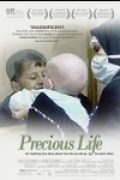
Directed by
Shlomi Eldar
90 minutes
Rated PG
Reviewed by
Bernard Hemingway

Precious Life
Synopsis: Muhammad Abu Mustafa is a Palestinian baby with a severe immune deficiency. His only chance of survival is a bone marrow transplant which he can only receive in an Israeli hospital. Shlomi Eldar, Gaza correspondent for Israel’s Channel 10 News, hopes he can make this happen by airing Muhammad’s story on Israeli television. But things are more complex than saving a life.Technically speaking, the debut documentary from veteran Israeli journalist, Shlomi Eldar, is as bare-boned as they come – there are no graphics, re-enactments or talking heads – it is strictly point and shoot. Yet in the best journalistic spirit Precious Life is a journey of self-discovery as Eldar engages with his subject matter and reflects on his own responses to it.
Of course, the story of the Palestinian baby and the efforts of the Israeli doctor to save him throws into relief the grotesque conflict between the two peoples and, probably not surprisingly, it raises in miniature many of the ethical and ideological issues involved. These are brought to a head when Muhammad 's mother and, from behind his camera, the director casually start to discuss Jewish religious holidays. This segues into the question of to whom Jerusalem rightly belongs. Both passionately believe that it is theirs but when Raida claims that all Palestinians would die before abandoning that right and that she would let Muhammad become a suicide bomber if this was what it took, the latter is stunned. It is this remark which becomes the focus of the second half of the film as Elda tries to come to terms with the possible evil consequence of his good intentions.
Precious Life offers us a microcosm by which we can observe human nature at work: where compassion and generosity contrasts with vindictiveness and suspicion, and faith engenders both trust and misunderstanding. These inferences are not forced messages, but are ones which emerge as events unfolds. It is to Eldar’s credit that he shows us the, even at a cost to his amour propre.
Despite the positive sentiments for future accord ultimately expressed by both, one feels that Eldar and Raida are too caught up in their entrenched points of view to truly embody this. Here, it is the operating surgeon with his non-judgmental vocational commitment to life who offers the real hope for peace, love and understanding.

Want more about this film?


Want something different?




